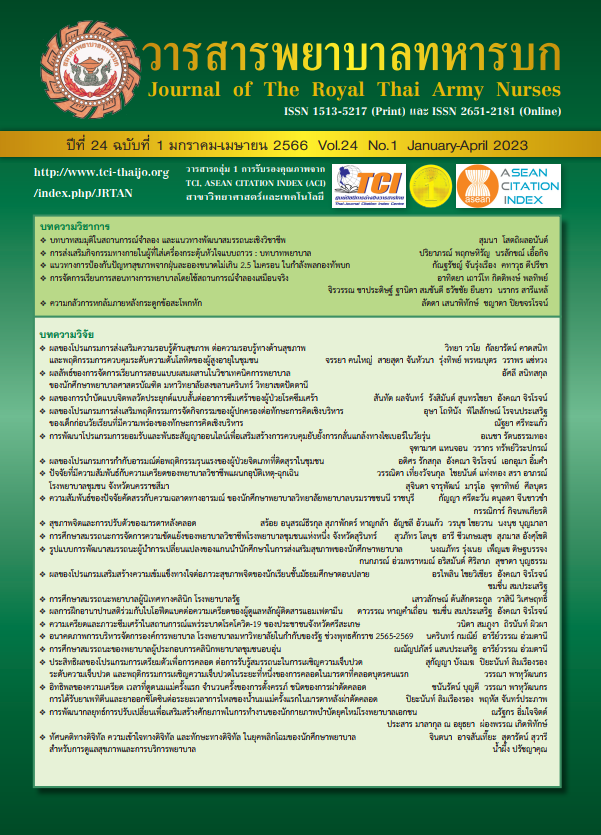The Effect of Health Literacy on Smoking Cessation Aid Program (HLSCAP) on Health Literacy and Perceived Skills in Helping Smoking Cessation among Village Health Volunteers
Keywords:
health literacy, skill, smoking cessation program, village health volunteersAbstract
This quasi-experimental research aimed to study the effect of health literacy on a smoking cessation aid program (HLSCAP) on health literacy and skill in helping smoking cessation among Village Health Volunteers (VHVs) in Muang Nakhon Pathom, Thailand. The samples were 48 VHVs by simple randomly selected. Research instruments comprised the Health Literacy Questionnaire (HLQ) and the Perceived Skills in Helping Smoking Cessation (PSSC). The data were analyzed using percentage means, standard deviations, and Dependent paired t-test.
The research findings showed that after the intervention, mean scores in knowledge and understanding, accessing health information, decision-making, communication, self-management, and media literacy, including perceived skills in helping smoking cessation, were significantly higher than before the intervention statistically (p <.01).
Nurses can apply the HLSCAP to promote health literacy and skill in assisting people with smoking cessation among VHVs, which can help increase smoking cessation.
Downloads
References
Health personnel can use the HLSCAP to promote health literacy and perceived skills among VHVs to help them have health literacy levels up and can be used to encourage smoking cessation in a community.
Health care providers such as nurses should organize training workshops to educate and promote smoking cessation assistance to VHVs at least twice a year to help them earn knowledge and skills to help people in the community quit smoking continuously. References 1. World Health Organization. Tobacco use falling: WHO urges countries to invest in helping more people to quit tobacco. 2021. 2. National Statistical Office Ministry of Digital Economy and Society. The 2021 Health Behavior of Population Survey. Bangkok 2022. (in Thai)
Tobacco Control Research and Knowledge Management Center. Tobacco and Lung Health. Bangkok2019. (in Thai)
Bundhamcharoen K, Aungkulanon S, Makka N, Shibuya K. Economic burden from smoking-related diseases in Thailand. Tobacco Control. 2016;25(5):532-7.
Watanabe O, Chompikul C, Mongkolchati A, Pimpis N. Performances of village health volunteers in elderly care in Muang District, Nakhon Ratchasima Province, Thailand. Journal of Public Health and Development. 2014;12(2):3-15. (in Thai)
World Health Organization. WHO Guidelines for implementation of Article 14 of the WHO Framework Convention on Tobacco Control. World Health Organization. 2013.
Ruamsook T, Tipwong A, Vorasiha P. Predictors of helping behavior on smoking cessation among village health volunteers in Samut Songkhram province. Thai Journal of Nursing. 2020;69(1): 10-8. (in Thai)
Thanomsat K. Effect of health literacy for smoking cessation assistance developing program on smoking cessation assistance abilities among village health volunteers. Tobacco Induced Diseases. 2021;19(1).
Cohen J. Statistical Power Analysis for the Behavioral Sciences. Burlington: Academic Press; 2013.
O’Conor R, Muellers K, Arvanitis M, et al. Effects of health literacy and cognitive abilities on COPD self-management behaviors: A prospective cohort study. Respiratory Medicine. 2019;160.
Nutbeam D. The evolving concept of health literacy. Social science & medicine. 2008; 67(12):2072-8.
Nutbeam D, Lloyd JE. Understanding and Responding to Health Literacy as a Social Determinant of Health. Annual Review of Public Health. 2021;42:159-73.
Stewart DW, Adams CE, Cano MA, et al. Associations between health literacy and established predictors of smoking cessation. American Journal Of Public Health. 2013; 103(7):e43-9.
Ruamsook T, Kalampakorn S, Rawiworrakul T, Attharos T, Tipwong A, Dhiranathara N, Anucha C. Correlation between Health Literacy and Smoking Behavior among Students in Higher Education Institute, Bangkok metropolis. Journal of The Royal Thai Army Nurses. 2022;23(2):357-63. (in Thai)
Panahi R, Ramezankhani A, Tavousi M, Niknami S. Health literacy and smoking. Journal of Research and Health. 2018;8(1):1-2.
Hoover DS, Wetter DW, Vidrine DJ, et al. Enhancing smoking risk communications: the influence of health literacy and message content. Annals of Behavioral Medicine. 2018;52(3):204-15.
Dülger S. The relationship between smoking cessation success and health literacy in patients given cognitive behavioral therapy and medical treatment. Journal of Substance Use. 2022:1-5.
Gunes NA, Gucuk S. The Effect of Health Literacy Levels on Successful of Smoking Cessation Therapy: A Survey Study. Eurasian Journal of Family Medicine. 2021;10(3):151-7.
Jeganathan C, Hosseinzadeh H. The role of health literacy on the self-management of chronic obstructive pulmonary disease: a systematic review. COPD: Journal of Chronic Obstructive Pulmonary Disease. 2020;17(3): 318-25.
Primack BA, Douglas EL, Land SR, Miller E, Fine MJ. Comparison of media literacy and usual education to prevent tobacco use: a cluster-randomized trial. Journal of School Health. 2014; 84(2):106-15.
Brockman TA, Patten CA, Lukowski A. Skill Sets for Family Members and Friends to Help Motivate a Smoker to Seek Treatment: Research to Practice. Addiction Research & Theory. 2018;26(6):525-32.
Hughes J, Smith LS, Garrett-Wright D. Brief intervention on nurses’ knowledge and behavior regarding smoking cessation. Journal for Nurses in Professional Development. 2018;34(5):257-62.
Rajaee S, Holder T, Indes JE, et al. A pilot study of a standardized smoking cessation intervention for patients with vascular disease. Annals of vascular surgery. 2019;61:91-9.
Downloads
Published
How to Cite
Issue
Section
License
Copyright (c) 2023 Journal of The Royal Thai Army Nurses

This work is licensed under a Creative Commons Attribution-NonCommercial-NoDerivatives 4.0 International License.
บทความหรือข้อคิดเห็นใดใดที่ปรากฏในวารสารพยาบาลทหารบกเป็นวรรณกรรมของผู้เขียน ซึ่งบรรณาธิการหรือสมาคมพยาบาลทหารบก ไม่จำเป็นต้องเห็นด้วย
บทความที่ได้รับการตีพิมพ์เป็นลิขสิทธิ์ของวารสารพยาบาลทหารบก
The ideas and opinions expressed in the Journal of The Royal Thai Army Nurses are those of the authors and not necessarily those
of the editor or Royal Thai Army Nurses Association.






